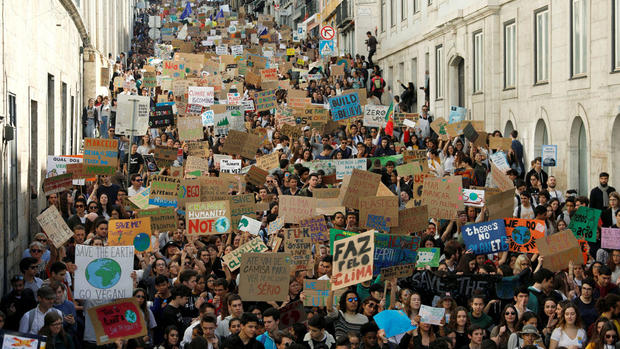Extreme weather affected 62 million people last year, UN climate change report says
United Nation's Secretary-General António Guterres told world leaders to come to September's climate summit in New York City with plans to take action on climate change, as the U.N.'s weather agency released its flagship report about global warming. The report said extreme weather last year hit 62 million people worldwide and forced 2 million people to relocate, as man-made climate change worsened.
"I'm telling leaders, don't come with a speech, come with a plan," Guterres said.
Guterres said climate change is a security and health issue for the world.
"The impact on public health is escalating," Guterres said. "The combination of extreme heat and air pollution is proving increasingly dangerous."
The World Meteorological Organization's annual state of global climate report says Earth is nearly 1.8 degrees Fahrenheit warmer than when the industrial age started. World leaders are trying to limit warming to 3.6 degrees.
Emissions from burning fuels such as coal, gasoline and diesel for electricity and transportation are contributing to global warming that in turn brings more intense storms, floods and droughts.
"We have seen a growing amount of disasters because of climate change," said WMO Secretary-General Petteri Taalas. He said since 1998, about 4.5 billion around the world have been hurt by extreme weather.
Cyclone Idai, which just hit Mozambique, is a good example, but is too recent to be in the report, Taalas said.
The past four years were the warmest on record, according to the report. That includes 2018, the warmest La Niña year on record, Taalas said. La Niña, a natural cooling of parts of the Pacific Ocean that changes weather worldwide, usually cools global temperature a bit.
"Last year, in the United States alone, we saw 14 weather- and climate-related disasters where the devastation cost more than $1 billion dollars each, with a total of some $49 billion," Guterres said.
The 44-page report says:
- Floods affected 35 million people.
- Drought hit another 9 million people, adding to the problem of growing enough food to feed the world.
- Ocean heat reached a record high, and oceans are getting more acidic and losing oxygen.
- With some exceptions, glaciers are melting and ice in the polar oceans is shrinking.
- The level of carbon dioxide in the air hit record highs.
"Carbon dioxide is the major problem here," Taalas said, adding that the gas stays in the air for hundreds of years.
Guterres called the U.N. report "another strong wake-up call."
"It proves what we have been saying that climate change is moving faster than our efforts to address it," he said. "It is important that we tackle climate change with much greater ambition. I am calling on [leaders] to come to the summit with concrete, realistic plans to put us on a sustainable path, once and for all."




